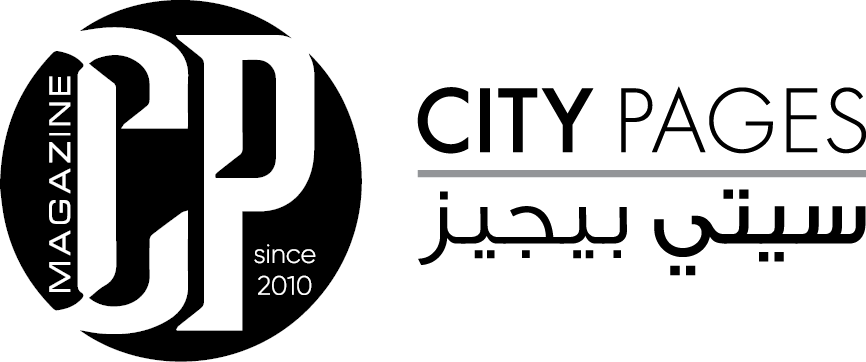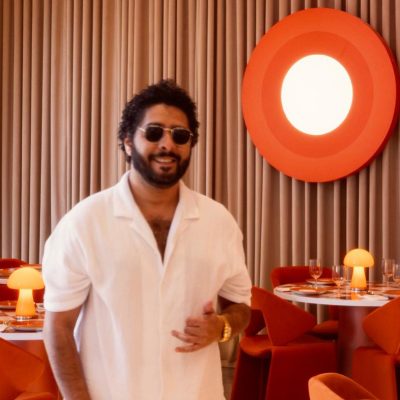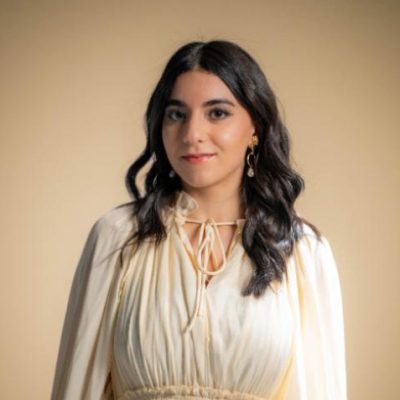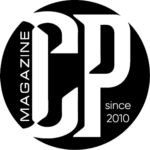We had a very interesting discussion and took the opportunity to ask many questions to know more about her and her diplomatic career.
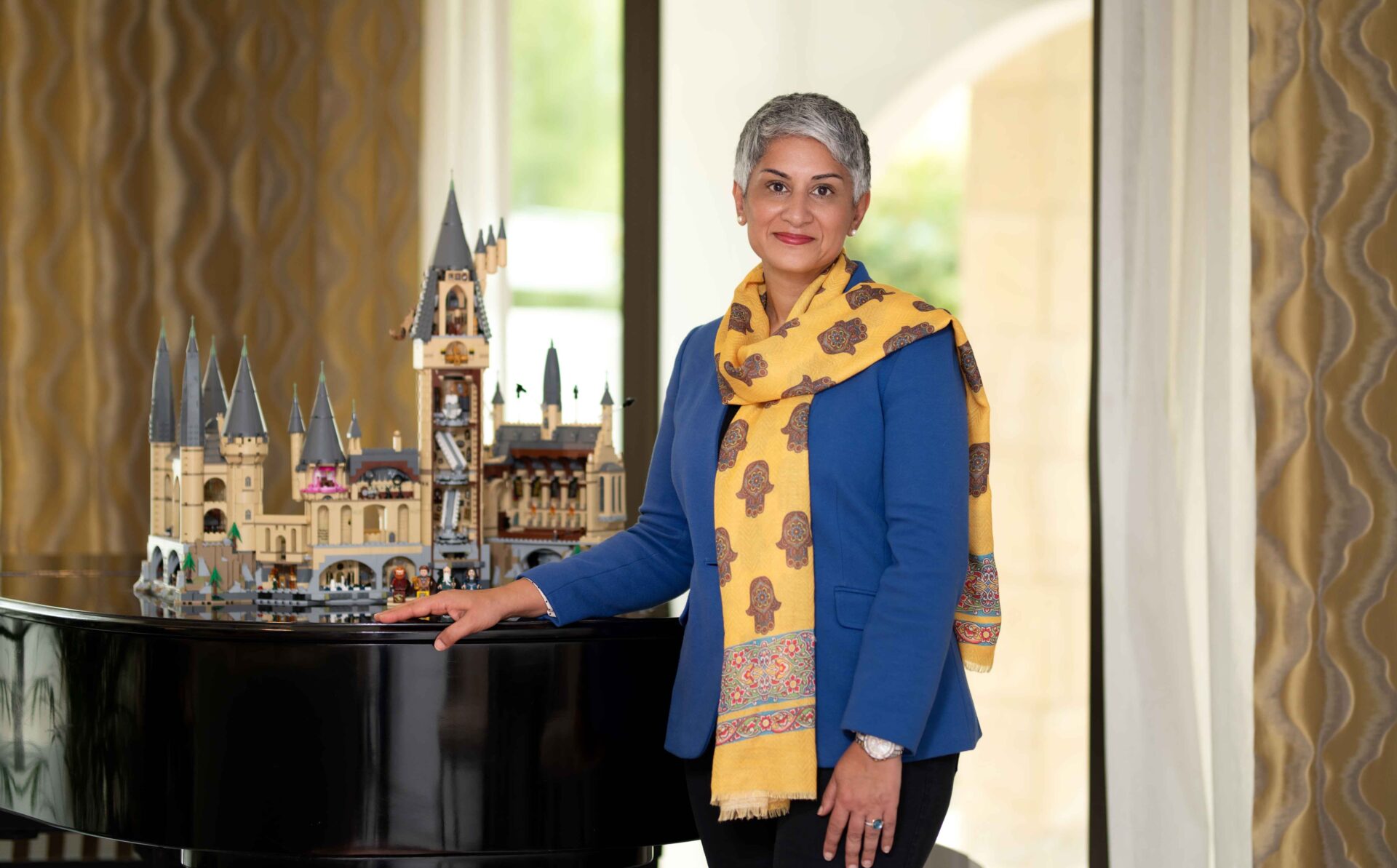
Can you please quickly walk us through your diplomatic postings prior to coming to Kuwait.
I have been a Canadian diplomat for 20 years now. My first posting was to Syria and I was there from 2002 to 2005. I actually joined the Foreign Ministry on September 9th, 2001. So, my entire career has been a post 9/11 career. I think one of the reasons that’s been very interesting is because we realized after 9/11 – not only in Canada but in many other countries – that there was so much about the world that we didn’t understand.
It has been a period during which, unfortunately, there has been a lot of stereotyping of people, of countries, of religions, and so when I think about what draws me to diplomacy, it’s about connecting with others, first and foremost. And of course, one of the ways that we connect is to get to know each other, and diplomacy facilitates this.
To foster better understanding, analysis and cooperation and to breakdown some of these stereotypes, our Foreign Ministry created several new diplomatic positions in this region, in South Asia and Africa, and elsewhere around the globe. The opportunity arose for me to go abroad, and I had signaled very early on that I was interested in being posted to this part of the world, so when the option came up for me to go to Syria I jumped at it. At the time, the decision was between going to Syria or Jordan. I was attracted to both and it wasn’t an easy decision. In the end, I chose Damascus, which was a fascinating experience. I was there for three years during a really interesting period in Syria’s history and met so many brave and wonderful people. And I subsequently did get posted to Jordan, so it was as though I was always meant to go there too.
While in Jordan my position was as the Head of our program for Iraq. We had an office in Baghdad, but our embassy was in Jordan so I would travel between the two countries. I did that for a couple of years and I learned a tremendous amount, including about conducting diplomacy in challenging environments. It was a very different experience from my first posting. In Syria, I was able to go everywhere freely. I would literally get in my car and drive to Aleppo or anywhere, and never really had to worry about my own personal safety. I did often worry about others, simply because of the way that diplomats were perceived at that time and the pressure that people would sometimes come under for meeting with us. Iraq was of course different because of the security situation. We were quite restricted in terms of where we could go and how we could get there and that made it harder to meet people and really get the feel of the place. But I was lucky that I actually got to do a lot and I tried to find different pathways to help gain an understanding of the people and their priorities.
One of those opportunities was doing consular work and helping Canadians in Iraq. I would meet them when they came to Baghdad from different parts of the country to get passports, DNA tests, or other kinds of services. I found it really interesting to hear from them about their experiences and what was happening across the country. Of course, the north was much more secure and we could travel quite easily in the Kurdistan region of Iraq, which I did frequently. Between each posting I went back to headquarters in our capital city, Ottawa. While at headquarters, I was the spokesperson for our department – Global Affairs Canada – and the Director of Media Relations. I’ve also worked a lot on human rights and human security issues throughout my career, and was a director in our Foreign Minister’s office just prior to coming here.
From 2014 to 2019, I was posted to Saudi Arabia. It was a such an extraordinary time to be there. When we arrived, the religious police were just starting to have their powers curbed, and we were beginning to see women becoming a more visible and public part of the national narrative. Over the next five years it was just change after change after change.
What was your first reaction or feeling when you heard about your posting to Kuwait and how was your reaction when you actually landed in Kuwait?
I chose to come to Kuwait and I’m very happy to be here. I feel privileged to have connected with so many warm and talented people; people with big dreams and ideas who are trying to make a difference in their spheres of influence. I’ve spent a lot of time in the region, as you can tell, and each place is different and unique.
Everybody asks why I was interested in coming to this country and being Ambassador here. There are a few reasons why I chose Kuwait. First of all, it was a family decision. At least in my family this is how we do it because we’re a team. If I’m going to do take on this role, it’s got to work for all of us because it’s quite all-encompassing, and that means it impacts my husband a lot, impacts my son a lot. We knew that Kuwait was a secure place where we could find good schools and a positive environment for a young family.
Kuwait stood out in several ways. I love being on the sea. I grew up in Vancouver, so anywhere that’s coastal is like home, and I had already spent a lot of time in the desert, so I thought it would be nice to have a balance. Kuwait also has an interesting connectivity with world through its trading history – including with India, where my ancestors are from, which I felt would be interesting to explore. I had met several accomplished Kuwaiti diplomats with whom I enjoyed working over the years, and it gave me a good impression.
Kuwait also has a strategic importance for Canada that is unlike any other country because it hosts our main air base in the region. It’s Canada’s only military base in all of Southwest Asia and it means that this relationship is always going to matter and that Kuwait is always going to be a key partner.
Through our Canadian Forces hub here in Kuwait, we participate in regional efforts to promote security and stabilization. Kuwait and Canada, for example, have both been part of the Counter-Daesh Coalition, and Canada is part of the NATO Mission in Iraq. Our base supports Canadian Forces members doing capacity building and training throughout the region, including with the Jordanian Armed Forces and Lebanese Armed Forces. When Kabul fell into the Taliban, we evacuated close to 4000 Canadians and Afghans through our military base here, so Kuwait’s support is invaluable on a number of levels.
Kuwait is also a country with which we cooperate extensively at the United Nations and other multilateral fora. We are aligned on a great many issues, including our shared commitment to upholding international law.
Since we arrived, my family and I have felt warmly welcomed and supported, and have eaten extremely well! We could certainly live without the traffic, but I suppose you can’t have everything!
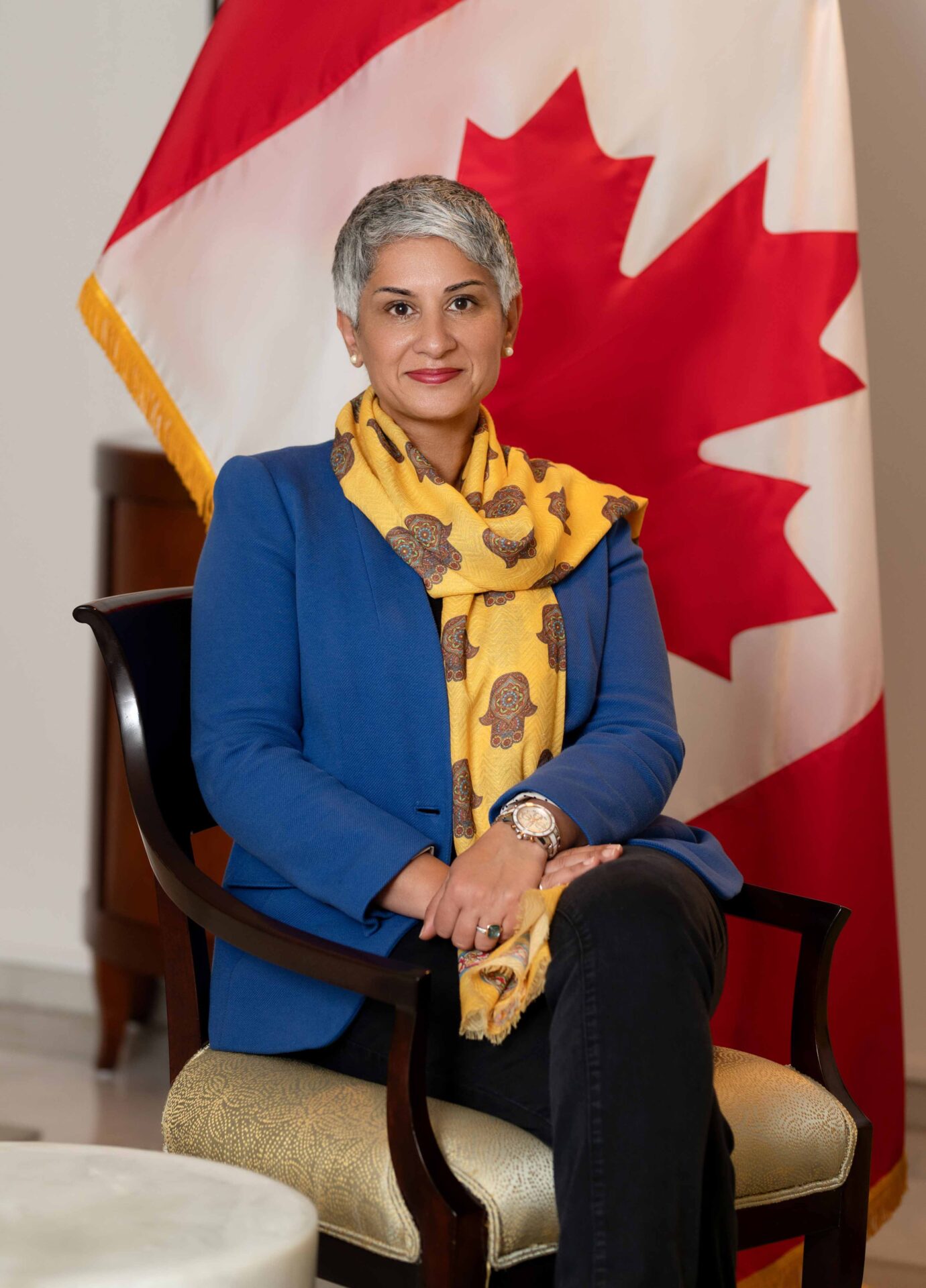
As the new Ambassador to Kuwait, what is at the top of your agenda?
My priority is to deepen and expand ties with Kuwait, politically and on the trade front, as well as culturally and in the values we want to promote together. One of the ways we’re doing that is by institutionalizing regular, high-level bilateral consultations on our key priorities across a range of sectors – political, security, prosperity and development cooperation. This consistent strategic connectivity will enable us to concretely advance these priorities.
We’re working to increase our bilateral trade and get more Canadian companies into Kuwait. Kuwait is also a very important source of foreign direct investment in Canada, and we of course want to see that increase. There are key areas where Canada and Canadian companies have experience or technologies that are important for the Kuwaiti context. Agri-food and food security is a big one. It’s a pre-occupation for the whole world right now, and particularly in Kuwait. Food is something that Canada does brilliantly, right from top-notch Canadian beef and seafood, to being a major exporter of high-quality staples like wheat and pulses. It’s a natural fit for Kuwait where people know quality. I mean, people come from all over the region to eat here! Our team organized a “Taste of Canada” food promotion event recently and everyone was so impressed with the taste and quality of the products. It was great to see!
Information communication technology (ICT) is another of our priority sectors. Also, oil and gas, because we too are a resource-based economy. We’re committed to climate action, so we’re doing a lot on renewable energy, carbon capture and clean-tech which we want to share. We’ve announced ambitious targets for our climate action policies, and Kuwait has done the same, so there’s lots to collaborate on.
Healthcare is another key area of focus for us – both education and management. As you know, many Kuwaiti doctors do their training in Canada, and it’s something we’re very proud of. These professionals often get tapped for leadership roles in the health sector upon return, or start their own institutions, so the impact of this education cooperation runs very deep. Through partnerships between Kuwait Institute for Medical Specialization and Canadian institutions, as well as the active role of entities like Accreditation Canada, Canada has become synonymous with the highest standards of trust and excellence in the healthcare sector.
Canadians have a really good story to tell and my team and I are committed to getting Canada even better known in this market.
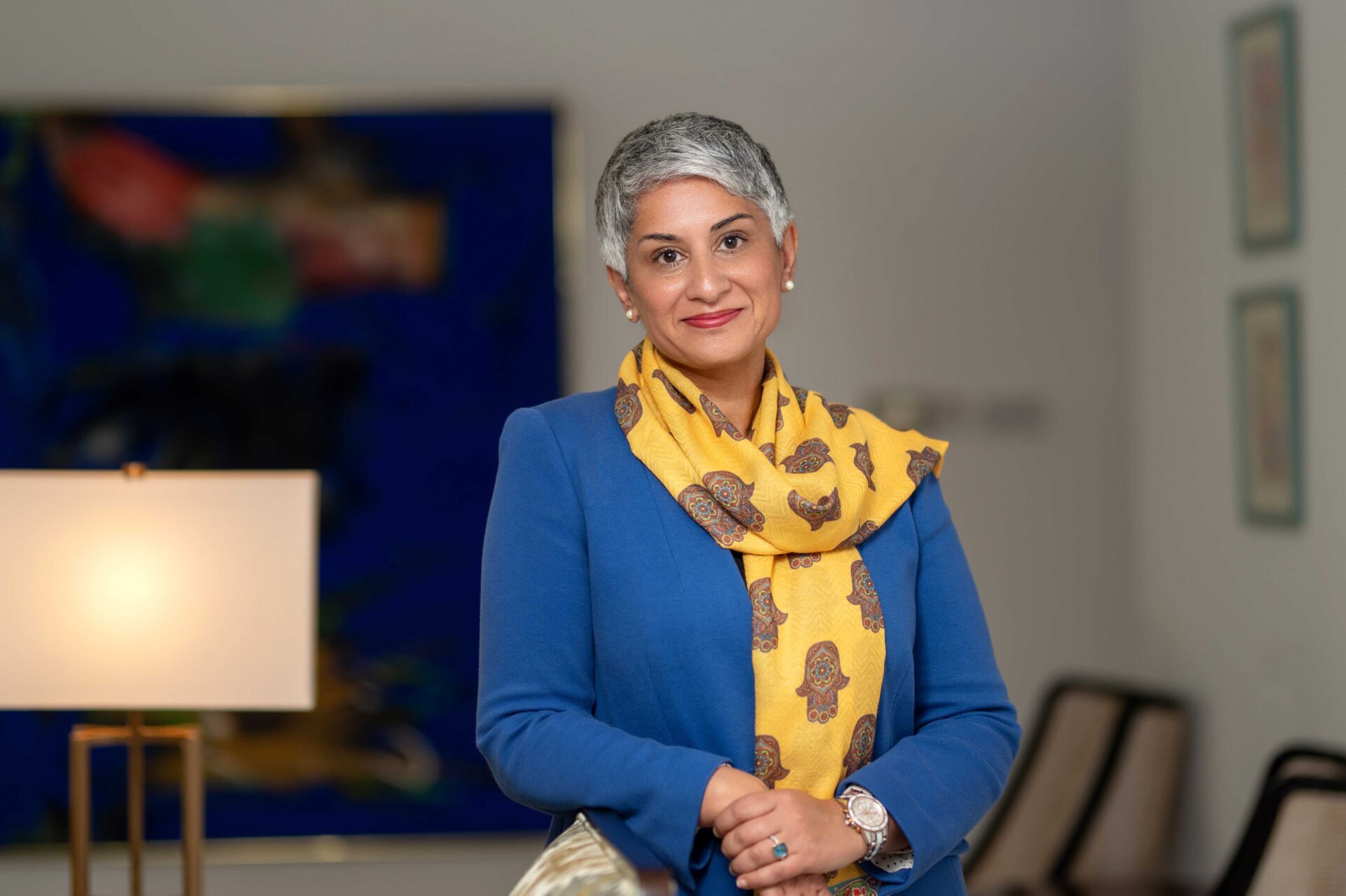
Canada is a popular study abroad destination for many Kuwaiti and international students alike. What advice do you have for students who wish to further their education in Canada?
First of all, try and talk to people who have studied in Canada. I think these stories and this experience is really useful. I’m always happy to talk to people, but I think it’s more important for students to speak to people they can relate to. Whether it’s family members or a friend, mentor or professor. I know that often at a lot of schools in Kuwait, students tend to find out about Canadian colleges and universities if they have teachers or academic counsellors who are Canadian or have experience in Canada.
We’ve been ramping up activities to profile Canadian education. We held an education fair not long ago and we also recently had representatives of Canadian universities visit Kuwait. Last year, we created an association of Canadian alumni here in Kuwait. It’s a diverse group with a lot of insights and expertise across sectors. We’re excited to help connect people who have studied in Canada because often some really interesting initiatives can grow out of those connections, and we’ve been fortunate to be able to involve some of the alumni in our education promotion activities to meet and share their experience with students.
It’s so helpful for potential students to hear from somebody who has experienced Canada as student; someone who comes from a similar context to hear about what they found positive, challenging, and how they negotiated those challenges. We are fortunate in Canada to have one of the most diverse and multicultural societies in the world. All the alumni I speak to tell me about the openness of Canada, and how they were embraced by their new community. It’s something that people find incredibly positive and that stays with them throughout life, integrated into their day to day. As a result, these alumni are some of the biggest champions of the Canada-Kuwait relationship.
I would also encourage students and families to study the EduCanada website (EduCanada) which has really comprehensive information about all of the schools and programs across Canada. I think it’s also important to think about who you are, what you want, and how to set yourself up for success. Some students know from the outset that they want to specialize in a particular field and choose the program and university accordingly – and that’s the main driver. Some will thrive in a big city, or somewhere where they have community or family support, while others will do better in a smaller environment where it’s much more student focused and there are fewer distractions. It’s a lot to think about – especially at that age – which is why it can be so helpful to learn from the experience of others.
Has it become an easier process for students to choose Canada post Covid or the system has become more difficult? As some countries are now stricter and they are filtering students.
It’s hard to say whether it’s easier or harder. Processing times are back to normal now that COVID backlogs have been cleared. Visa processes are generally straightforward, and almost entirely online, but it’s important that people answer all the questions in order for applications to be processed. Throughout COVID and even now, what we prioritized student visa applications to ensure that students could get where they needed to go, when they needed to get there.
We’ve been working very closely with our team in Abu Dhabi, which is our regional immigration hub to make sure that it happens and it’s going well. One challenge we do notice is that sometimes students get incorrect information from a friend or non-official source, and end up having complications with visas or study permits as a result, so we really encourage students to contact their international student office, our Embassy, or Immigration, Refugees and Citizenship Canada (IRCC) to get accurate information.
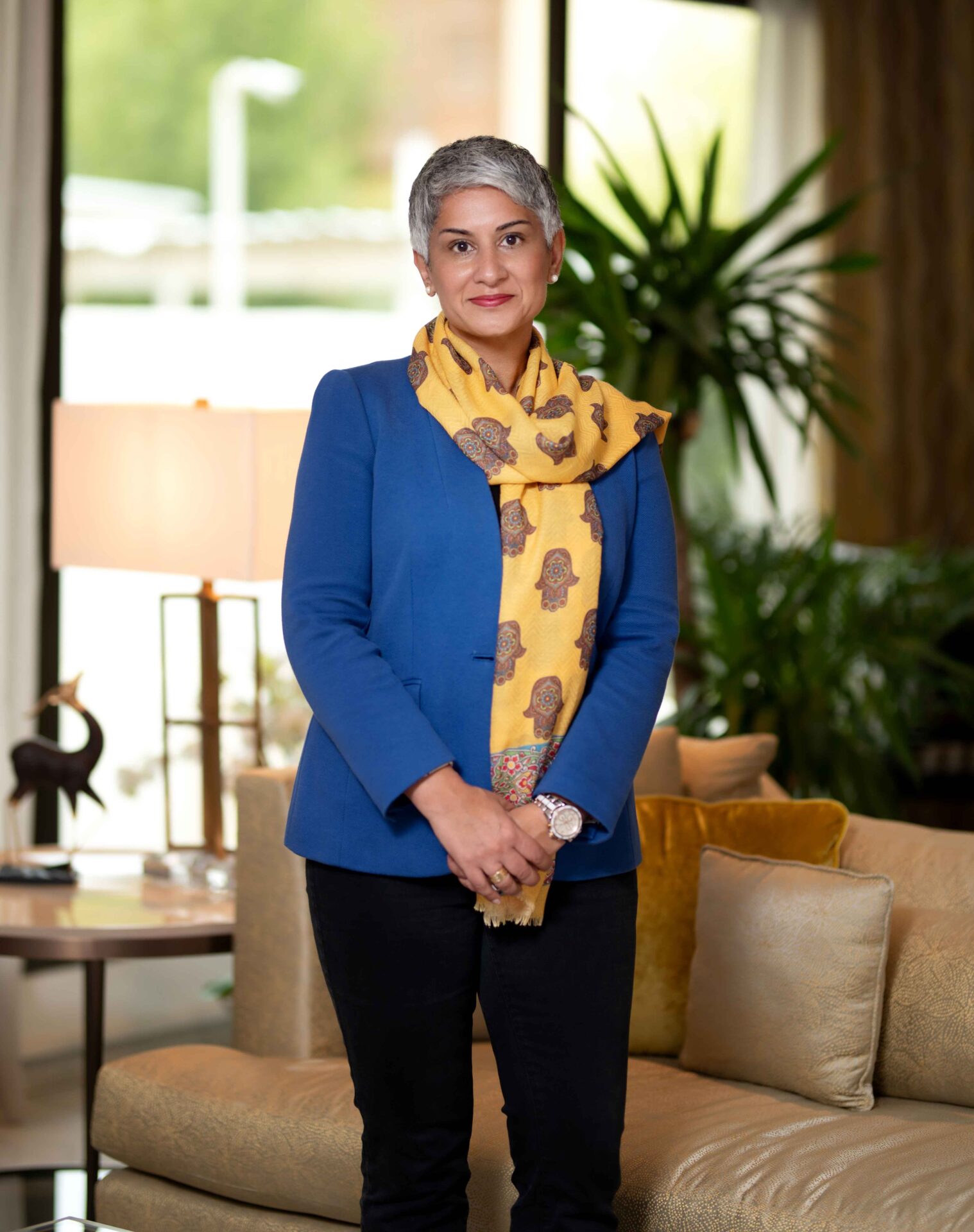
When you speak to friends in Canada these days, is there anything particular about Kuwait that always point it out to them?
That’s a really good question. First, it’s people. I’ve met so many amazing people in Kuwait – both from here and from all over the world. Obviously, I talk to them about food because how can I not?! It’s just fantastic. The quality and the variety. And my husband will tell you that I am someone who navigates and gets to know places through food, so I love that about Kuwait!
I always tell people about the diwaniyas, which are so uniquely Kuwaiti. I’ve learned a lot by going and meeting people at diwaniyas. It’s so interesting to meet contacts in their family setting. You never know quite whom you will meet or the conversations you will have, but there’s always something of interest. The experience of being in a country that has gone through invasion and regained its freedom also makes for something very unique. I find that experience is present daily, and is part of the fabric and identity of the country. So many people appreciate and feel connected to Canada because of our role in the liberation of Kuwait. I tell people about places like Mubarakiya, which I really love. To me it’s like the heart of Kuwait City in many ways. I also share everyone how much I love being on the water here – and the beautiful islands that very few people outside Kuwait would know about. I’ve been learning to sail at Kuwait Sailing School – something I’ve always wanted to do. I also share what I’m learning about Kuwait’s biodiversity, from mangroves, to flamingos!
One of the topics that gets me most excited is talking about Kuwait women and youth. I’ve been endlessly impressed by so many of the women and young people that I meet here – and it’s not to say anything negative about the men – but there are a lot of stereotypes about the region as you know. People are always asking me the question, “How is it to be a woman in Kuwait or how is it to be a woman ambassador in Kuwait? Across the board, Kuwaiti women are really at the top of their game, leading a lot of initiatives with an enormous amount of intelligence and creativity, and also a real rootedness and a strong sense of being Kuwaiti. Of course there are sectors where women are under-represented in leadership positions; but things are changing and it’s exciting to see that happen. I’m a big believer that having diverse perspectives, experience and skills in leadership leads to better outcomes for us all.
What do you love to tell Kuwait about Canada?
I talk about Canada’s natural beauty because it is something special. I’m from Vancouver on the West Coast, so I do get a little bit biased towards the combination of mountains and ocean, but there is such beauty across our country. Our major cities have such different personalities. Vancouver, for example, feels like a very Asian city – a bridge between continents – which I think is exciting.
Toronto is literally the most diverse city in the world and is always buzzing. Montreal has a very particular flavor – a blend of language and culture you just don’t get anywhere else. Quebec City is beautifully unique. Many people say it feels like a combination of North America and Europe. The east coast and Maritime provinces have epic scenery, great seafood and a warm and inviting culture. Of course I tell people about great Canadian food – and I also talk to people a lot about diversity because, to me, it’s one of the real strengths of Canada. Our country is made-up of so many different people from so many different places, with different stories, and I think one of the things that I’ve appreciated about being Canadian my whole life, and we moved to Canada when I was eight is that. I can be Canadian and be everything else that I am at the same time. I’m a woman, I’m of South Asian origin, I’m Muslim, I’m a daughter, wife and mother; all of this coexists in me all at the same time. I don’t feel any need to choose or prioritize one part of my identity over another in order to fit in. I can be everything I am all at once – and that to me the essence of being a Canadian.
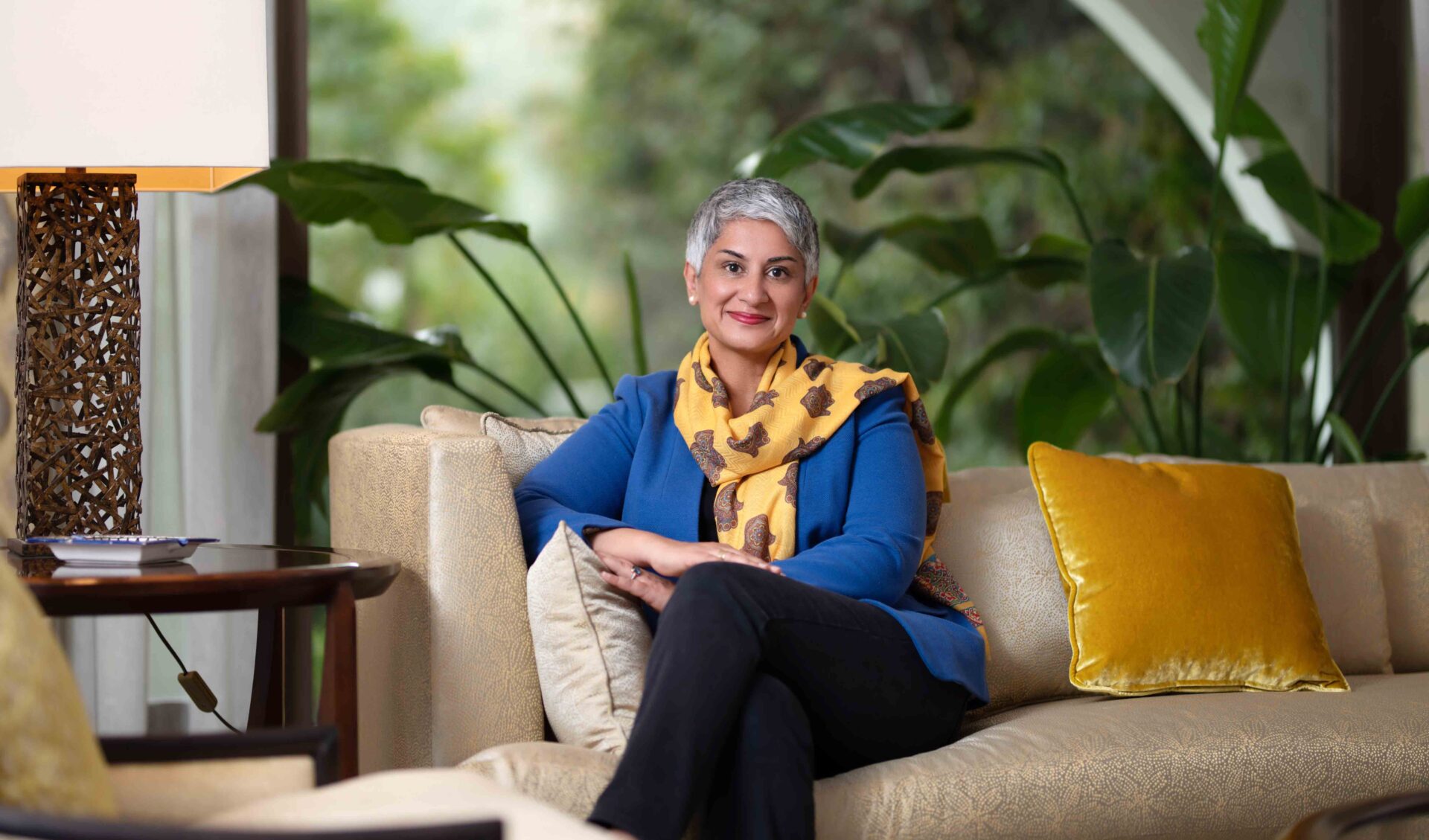
To a new comer from Canada to Kuwait, what are the 5 places in Kuwait that you would suggest to visit?
Definitely Mubarakiya Souk and anything on the water. I think if you can go sailing, absolutely check out some of the islands. It’s a wonderful experience for anyone. Try some of the museums as well; the impressive collections at Dar al-Athar al-Islamiyah and Tareq Rajab Museum, and the Sheikh Jaber Al-Ahmad Cultural Centre which is my son’s favourite. Something we’ve also really enjoyed, for example, is going early on a Friday morning to the farmers’ market in Abdali. The produce there is wonderful. It’s all grown locally, and so tasty. Some farmers specialize in specific items. There is one stand that only does lemons. Three different kinds of lemons – and it’s honestly the best lemonade I have ever had (no sugar added). Everything that we tried was so delicious and fresh, and it’s wonderful to see what the community has created, because this market is a local initiative.
One of my other favorite places here is Shamiyah greenhouse, which is right in the center of Shamiyah, near the Youth Public Authority building. It’s a project started several years ago by a group of grandmothers who got together as they were a bit worried that their grandchildren wouldn’t have green space and they were a concerned about the climate change and the environment. So, they got permission to start greening the area and it is now quite spectacular. They do permaculture, planting, education programs for kids, and all kinds of community activities. They’ve got a committed and growing group of volunteers of different ages, several of whom are architects or experts in permaculture. They’ve built a diwaniya out of recycled materials to host community workshops. We did an initiative with them last fall for Canadian Thanksgiving where we had kids come in and do crafts out of recycled materials and planting as well. The kids loved it – it made the feel so much more connected to the environment and gave them a sense of doing good. It’s amazing what can be accomplished when a group of people comes together with a purpose and a vision to do something good for future generations. It can, really result in something very special.
Are there any specific challenges that you had to face as a female diplomat and do you see any improvements in this?
I’m an optimist by nature; so, I do tend to think that things are getting better and certainly from when I started in diplomacy 20 years to now, it absolutely has been the case. There has been huge progress in terms of the opportunities for women diplomats and how women are regarded in the profession. We’re no longer regarded as being suitable only for certain roles or postings. There are far more women in leadership positions and influencing policy development, which is so important. I’ve definitely encountered challenges, and still do, but the overall trajectory is positive. In Canada we are fortunate that our government has really prioritized having gender balance in our foreign service and particularly amongst ambassadors. As of this year 49% of our ambassadors are women – and it’s not a coincidence or accident – it’s the result of deliberate government policy to ensure that our ambassadors and diplomats reflect who we are as Canadians. So, to be part of that is pretty exciting.
We have more women in cabinet roles in Canada than ever before. Our Deputy Prime Minister and Ministers of Foreign Affairs, Trade, and Defence are all women, among others. As a woman diplomat, I think there is still progress needed – in Canada and elsewhere – related to intersectionality. We have more women at decision-making tables, but what about diversity within that group? Intersectionality, and harnessing our layered identities can make us stronger when viewed and embraced as something of value.
As a diplomat, living and working in countries outside my own, something I notice often, whether at home or abroad, is the tendency we have to label people or put them in a category in our mind without sometimes even realizing we’re doing it. Perhaps it’s a way to try and make sense of things, but what it does is to obscure the identities and experience that are inherent in each person and it means we sometimes miss opportunities to connect or to deepen our understanding and analysis.
When someone meets me, they will often focus on my age and gender – assuming that these attributes pose an obstacle to what I do and how I’m perceived in my role, and yet, rarely does anyone ever make similar assumptions about younger male ambassadors. Nobody ever asks male diplomats about how they balance work and home life and so on. Every single female diplomat I know with a family gets asked that question. Earlier in my career, I often found myself in places where people didn’t expect me to be – a young woman of colour representing Canada and working on security issues in predominantly male environments, or in a conflict zone. On so many occasions, my legitimacy was questioned by people who said, “But you don’t look Canadian” or “aren’t you very young to be doing this?”
These experiences are frustrating but I have found that they are also opportunities, because when people are surprised or when something is unexpected, you have an opportunity in that moment to help educate or to start a conversation. One of the things that has been most important to me is allyship. Whether you’re a diplomat or in any other profession, often women’s voices and contributions don’t get listened to as much as men’s which is unfortunate because we miss out on so much – so many ideas, so much knowledge. This is slowly and steadily changing, and I think one of the most powerful things that anyone can do to be an ally and help amplify people’s voices. So, if you hear a woman or anyone from an under-represented group put forward a good idea in any setting, and if it seems like it’s not being listened to properly, you can restate it and give that person credit. Support them for opportunities and promotions, mentor them. I think the more that we all do this, the better.
One very simple thing that I do, and I encourage other people to do is to introduce your team properly. Let people know what their role is, that they have your trust, no matter what they look like. As Canadians, we have very diverse teams, and it’s not always what people expect, so this is really important to ensure that the team has credibility and is set up for success. I often find myself in spaces where I’m the only woman in the room. This has happened a lot throughout my career. Sometimes, it’s exciting to be the first. It can also be tiring. But, there are opportunities that come with it. I think for each generation that is true. I learned a lot from my Mum and a lot from my Dad. My Mum has had an entire career of “firsts.” She is incredibly good at what she does, but what also helped is the strong support of important allies, including my Dad, the whole way through. It comes back to the team. I’ve been very lucky because I’ve had that modeled for me my whole life. No matter what the difficult situation is I’ve always felt like there’s a way through.
What message would you give on this International Women’s Day and also what advice can you give to young people who want to pursue a career in diplomacy?
International Women’s Day is an incredibly important time to recognize the contributions that women make and understand the obstacles that we still have all over the world to women’s full participation in society. To women and girls: support one another, build each other up, share stories of excellence and bravery, each and every day. To everyone, I would say, use the opportunities you have to champion gender equality in your sphere of influence – whether it’s in your family, at school, at work – anywhere. Every effort makes a difference it’s a conversation or support at the right time, actively taking an interest in someone’s career, protesting gender-based violence, or advocating for legal rights. It can be all sorts of things.
We will only be the best of ourselves and the best societies we can be when everyone is participating equally. And everyone can play a role in that. Everyone can be an ally and do something helpful to support women, girls, and marginalized groups to ensure that they have real opportunities. When we have partners, that is how we win. Because if I look at my own experience, I have been mentored by women, I have been championed by women, but I’ve also had very important champions and mentors who are men and have been instrumental to my success, starting with my own family.
Finally, your message for us at CP magazine.
Well, I’m looking forward to getting more familiar with your magazine. I think it’s wonderful that you’re helping people to discover stories, ideas and people that they might not otherwise know about. It’s such an important way to enrich community and to get to know a place. Sometimes you get inspired by hearing about what someone else is doing and it really sparks your imagination about what’s possible and what you can contribute. I’m really looking forward to see what you come up with next in terms of themes and the people and initiatives you profile.
